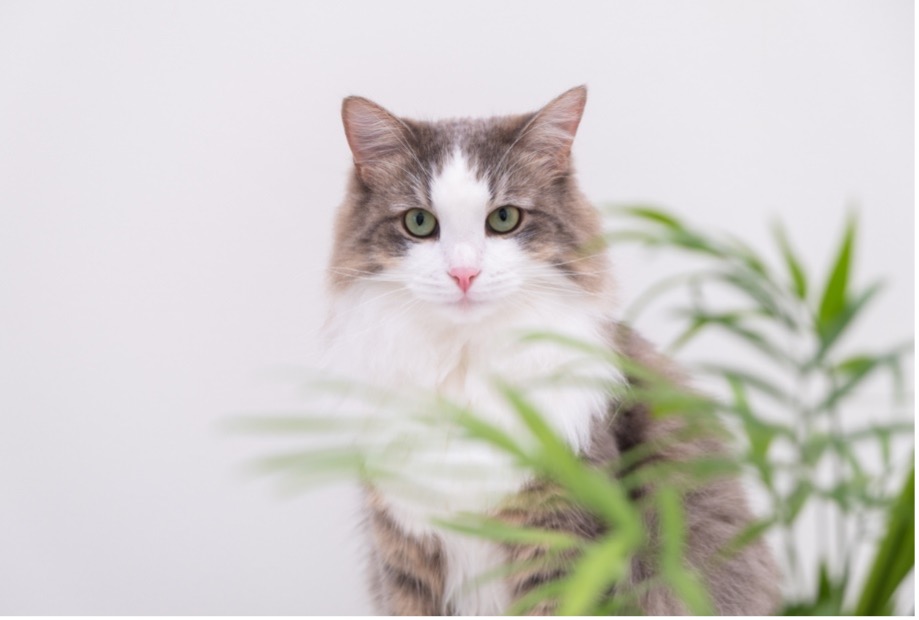March is Pet Poison Prevention Month, so we will cover the common pet poisons so you know what to watch out for. Our goal is to educate you so that you do not have to go through the stressful experience of your loved one being affected by any of these poisons.
Cleaning Products
Many cleaning products are fine to use around your pets. In any case, your cleaning product may have special instructions to ensure the safety of your animals.
For instance, if the label states, “keep pets and children away from the area until dry,” follow those directions to prevent possible health risks. Products containing bleach can safely disinfect many household surfaces when used correctly. However, they can cause stomach upset, drooling, vomiting or diarrhea, severe burns if swallowed, and respiratory tract irritation if inhaled in a high enough concentration. In addition, skin contact with concentrated solutions may produce severe chemical burns. Some detergents can create a similar reaction, and cats can be particularly sensitive to ingredients such as phenols. Phenols are organic compounds that you find in many products.
As a rule, store all cleaning products in a secure cabinet out of the reach of pets and keep them in their original packaging or a clearly labeled and tightly sealed container.
Air Fresheners
Some forms of air fresheners can be quite toxic, especially to animals (and children!) who might ingest the substances or cannot avoid the parts of the home where air fresheners are used.
The ingredient list for most air fresheners are volatile organic compounds (VOC). VOCs are organic chemicals that have a high vapor pressure at room temperature. These substances can cause a long list of maladies. According to the Environmental Protection Agency, the health effects of VOCs may include:
- Eye, nose, and throat irritation
- Headaches, loss of coordination, lethargy, and nausea
- Damage to the liver, kidney, and central nervous system
- Some VOCs can cause cancer in animals; some are suspected or known to cause it in people
Essential Oils
Essential oils, which are included in many air freshener products, can be very toxic, especially to cats. If you simply must have essential oils in the home, make sure they are kept in a location where your pets cannot come into direct contact with them.
For more information about air fresheners and essential oils toxicity to pets, you can access the article from PetMD here.
Poisonous Plants
Some of the common plants to ensure your pets avoid here in Nevada are:
- Wild parsnips
- Poison ivy
- Stinging nettles
- Foxtail
For more information about plants and spring hazards please read our article on Spring Hazards.
Insecticides/Pesticides/Herbicides/Rodenticides
As with household cleaners, read and follow label instructions before using any type of insecticide, pesticide, herbicide, or rodenticide in your pet’s environment. For example, flea and tick products labeled “for use on dogs only” should never be used on cats or other species, as severe or even life-threatening problems could result. Always consult with your veterinarian about the safe use of these products for your pet.
It can be difficult to keep pets out of gardens. We recommend using safe and non-toxic alternatives. Here are some sites to give you some ideas:
The All American Turf
Daily Paws
Better Homes & Gardens
If a pet ingests rat or mouse poison, potentially serious or even life-threatening illness can result; therefore, when using any rodenticide, it is important to place the poison in areas completely inaccessible to pets. Some newer rodenticides have no known antidote and can pose significant safety risks to animals and people.
Foods Poisonous to Pets
Food is in the top three of the most common things that poison pets. Food that is safe for humans can be deadly for pets. To be on the safe side, you should never allow your pet to have any of the following things:
- Coffee – either the grounds, beans, or the drink itself. Caffeine of any kind can be deadly if ingested in sufficient quantity.
- Chocolate
- Avocado
- Xylitol (artificial sweetener)
- Garlic
- Onions
- Salt
- Grapes or raisins
- Alcohol
- Foods with a lot of fat
- Macadamia nuts
Human Medication
Pets ingesting medication meant for humans is the number one reason people call the emergency animal poison control number.
You should never give your pet any human medication unless specifically directed by your veterinarian. That includes:
- Painkillers like ibuprofen, naproxen, or acetaminophen (Advil, Aleve, Tylenol, etc.)
- Antidepressants or anxiety medications
- ADHD drugs (Ritalin, Concerta, etc.)
- Cold medicines
- Diet pills
- Prescription medications for medical conditions
- Vitamins and supplements. * Note, there are vitamins and supplements made specifically for pets that are safe. If you would like to find out more about them for your pet, please feel free to ask us.
If you have any questions about a particular medication, just call us at 775-753-9111; it will be so much safer and better for everyone.
Signs of Poisoning
It is crucial as a pet owner that you know the signs of pet poisoning so you can seek medical help as soon as possible. These are some of the common things to watch out for:
- Vomiting
- Diarrhea
- Lethargy
- Irregular/stumbling gait
- Lack of appetite or water intake
These are the basics and not a comprehensive list, but if you observe any of these indicators, you should act as quickly as possible because the faster you get help, the better the chances are that there will be no long-term adverse effects for your loved one. To find more signs of pet poisoning, you can go here.
How to Handle Pet Poisoning
If you see signs that your animal may be poisoned or you suspect they ingested something poisonous, don’t wait! Call us immediately at 775-753-9111. The faster you act, the better the chances are that your furry family member can make a full recovery.
You can also call the Pet Poison Helpline – (855) 764-7661
As an important reminder: do not induce vomiting in your pet after poison ingestion unless you are directed to do so by a trained professional.
Final Words
Even when you think there are no poisons in or around your home, it is always best to stay on guard when it comes to your pet and potential dangers. When there is an emergency concerning your pet, it is common for people to panic and get disoriented. For this reason, we recommend you keep our number and the Pet Poison Helpline where anyone in your family can easily find it.
Remember, we are here for you and your pet, and it is our privilege to help relieve an animal’s pain and owners’ distress when the animal doesn’t know it can be helped and the owner has lost hope. Please do not hesitate to ask us questions, we are happy to help.
Sincerely,
Dr. Kathryn Moriarty & Team
Aspen Veterinary Clinic

